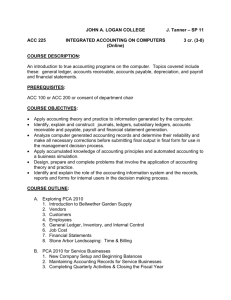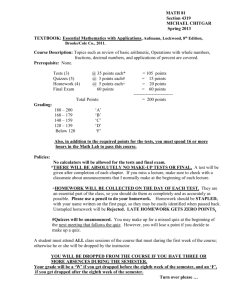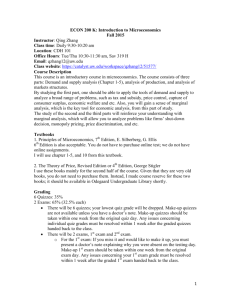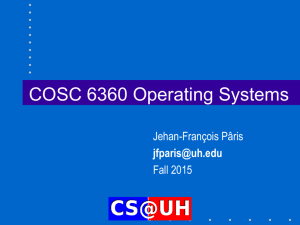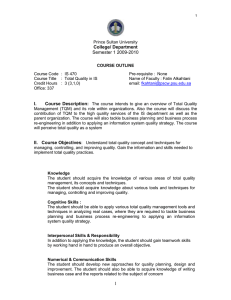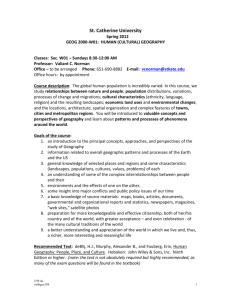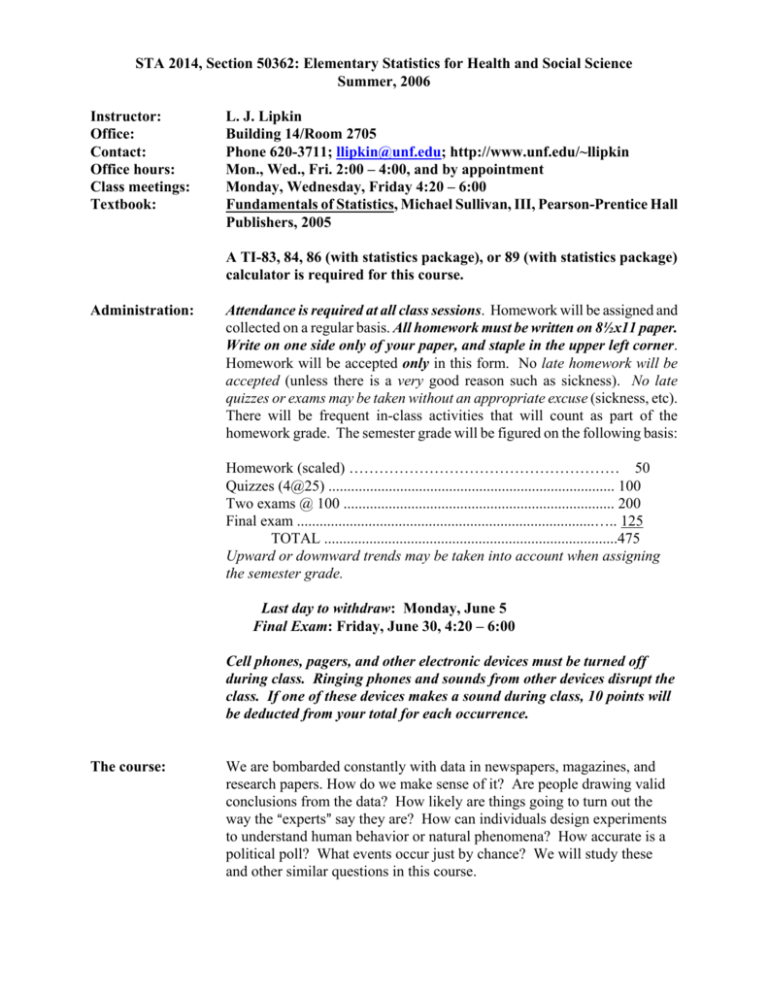
STA 2014, Section 50362: Elementary Statistics for Health and Social Science
Summer, 2006
Instructor:
Office:
Contact:
Office hours:
Class meetings:
Textbook:
L. J. Lipkin
Building 14/Room 2705
Phone 620-3711; llipkin@unf.edu; http://www.unf.edu/~llipkin
Mon., Wed., Fri. 2:00 – 4:00, and by appointment
Monday, Wednesday, Friday 4:20 – 6:00
Fundamentals of Statistics, Michael Sullivan, III, Pearson-Prentice Hall
Publishers, 2005
A TI-83, 84, 86 (with statistics package), or 89 (with statistics package)
calculator is required for this course.
Administration:
Attendance is required at all class sessions. Homework will be assigned and
collected on a regular basis. All homework must be written on 8½x11 paper.
Write on one side only of your paper, and staple in the upper left corner.
Homework will be accepted only in this form. No late homework will be
accepted (unless there is a very good reason such as sickness). No late
quizzes or exams may be taken without an appropriate excuse (sickness, etc).
There will be frequent in-class activities that will count as part of the
homework grade. The semester grade will be figured on the following basis:
Homework (scaled) ……………………………………………… 50
Quizzes (4@25) ............................................................................ 100
Two exams @ 100 ........................................................................ 200
Final exam ...............................................................................….. 125
TOTAL ..............................................................................475
Upward or downward trends may be taken into account when assigning
the semester grade.
Last day to withdraw: Monday, June 5
Final Exam: Friday, June 30, 4:20 – 6:00
Cell phones, pagers, and other electronic devices must be turned off
during class. Ringing phones and sounds from other devices disrupt the
class. If one of these devices makes a sound during class, 10 points will
be deducted from your total for each occurrence.
The course:
We are bombarded constantly with data in newspapers, magazines, and
research papers. How do we make sense of it? Are people drawing valid
conclusions from the data? How likely are things going to turn out the
way the Aexperts@ say they are? How can individuals design experiments
to understand human behavior or natural phenomena? How accurate is a
political poll? What events occur just by chance? We will study these
and other similar questions in this course.
Note Well:
(1) This summer course covers one whole semester in HALF the time. Do
NOT take too many courses at once. You should expect to study at least
twelve (12) hours per week outside of class in order to be successful.
(2) You must be sure to do ALL of the assigned homework in a timely
fashion. Do not fall behind! It’s hard to catch up. To help you keep up,
there will be four quizzes and four graded homework assignments. See
the tentative schedule for the dates.
(3) In all courses you must READ the book CAREFULLY. This is
especially true of mathematics and statistics books. The purpose of the
course is to examine applications, so the examples and problems must be
read and understood before it is possible to analyze them.
(4) Items 2 and 3 above indicate why you should expect to study at least
twelve hours per week. You must read the book carefully and work
seriously on the homework assignments.
(5) The Rewards: By following all of the instructions given above, you
will earn a good grade in the course, and you will become adept at solving
problems and understanding new material in all of your work.
How to succeed:
First, attend every class, ready to listen and to work in the classroom. Be
sure to take good notes.
Second, check Blackboard regularly to get updated course information.
However, Blackboard is not a substitute for class attendance. Check your
UNF email regularly.
Third, read the assigned sections in the text very carefully. Too often
students read only the computational examples or only the computational
problems. You need to read all of the text, and read the applications
carefully. Careful reading gets you about 75% of the way to solving a
problem.
Fourth, work seriously on all of the assigned homework problems, not just
the ones that will be handed in.
Fifth, when you need help, come to my office. If you are unable to come
during the announced office time, please ask about arranging another time for
us to meet. Don’t wait until just before class or just before a quiz or exam to
get help. Begin your reading and problem-solving soon after the assignment
is given. Having done that, you will have thought carefully about the
material, and we can work together to clarify your understanding.
Sixth, keep in mind that this course may be different from most mathematics
or statistics courses that you have taken before. We will learn technical and
computational techniques, but the focus of this course will be the use of these
techniques as tools to solve problems. Merely learning techniques is not very
helpful, and certainly not very interesting.
STA 2014, Section 50362: Elementary Statistics for Health and Social Science
Summer, 2006
Tentative Schedule
(This schedule will be adjusted as needed)
Wednesday
2.3; 3.1 – 3.2
Friday
Quiz #1; 3.2 – 3.3
May 15
Monday
Introduction;
2.1 – 2.3
HW #1 due; 3.4 – 3.5
4.1 – 4.2
Quiz #2; 4.2 – 4.3
May 22
HW #2(a) due; 5.1 – 5.2
Exam I; 5.3
6.1 – 6.2
May 29
Memorial Day Holiday
HW #2(b) due;
7.1 – 7.2
7.2 – 7.3
June 5
HW #3 due; 7.4 – 7.5
7.5 – 7.6
Quiz #3; 7.6
June 12
Exam II
8.1 – 8.2
8.2 – 8.3
June 19
HW #4 due; 9.1 – 9.2
9.2 – 9.3
Quiz #4; 9.3 – 9.4
June 26
10.2, 11.2
review
Final Exam
Week beginning
May 8






